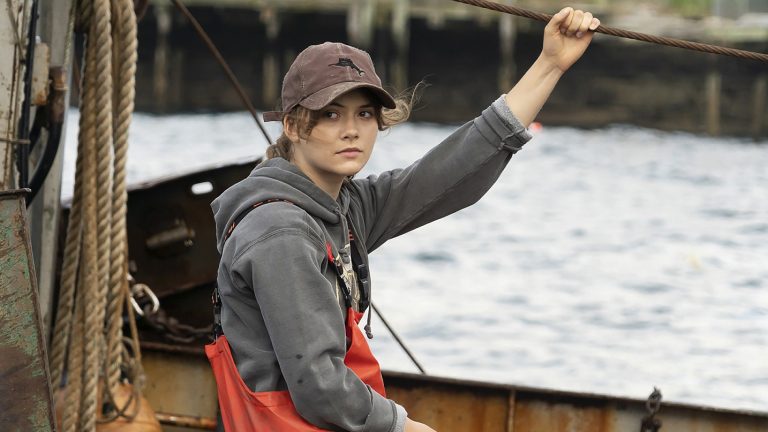
One of this year’s most wonderful movies, CODA, made its debut as the opening night selection of the Sundance Film Festival this past January, where it also picked up four festival awards, including the Dramatic Grand Jury Prize and a special juried recognition of the ensemble. The film, whose title stands for Child of Deaf Adults, follows Ruby (Emilia Jones), a hearing teenager in New England who considers pursuing a career in singing, something that stands at odds with her experience being the children of Deaf parents, Jackie (Marlee Matlin) and Frank (Troy Kotsur), and the sibling of a Deaf brother, Leo (Daniel Durant).
This film is a fantastic example of inclusion across the board, and I had the chance to participate in an eye-opening and uplifting series of conversations with all four main cast members and director Siân Heder about the film. Those interviews have been edited for clarity and content, and memorable excerpts and anecdotes can be found below. CODA opens on Friday, August 13th in theaters and on Apple TV+.
Q: How does this film look like the French film it’s based on, La Famille Bélier?
Siân Heder: I approached it as if I were using the story and not the movie. When I watched the original French film, I was very moved by it, and yet, going into the process of writing it, I never looked at the script from the original. I really just had watched the movie, let it make an impression on me, and then I wanted to approach it from a very personal standpoint, so I wrote it for a place that I knew really well. I grew up in Cambridge, Massachusetts. I would go up to that fishing town, Gloucester, Massachusetts every summer when I was a kid, so a lot of the characters in the movie, the place, the feel of the town, was very specific and very personal to me.
So I think for me, it was about taking what was there and deepening it. The casting of Deaf actors in these Deaf roles was very important to me, and also digging in more authentically to Deaf culture and what that experience is like for a CODA. It was really an opportunity to take a great story premise, and then find ways to make my own movie out of it. It was actually lovely to be able to work off that material, but then find a way to make what felt like, at the end, a very personal story.
Marlee Matlin: I can’t really speak to the French film because I didn’t see it. I haven’t seen it even to this day. I chose not to because I didn’t want the performances of the actors in that film to affect my performance. Knowing what they have done in that film. So I just did it and approached the film my way based on the script that I read and working with Siân, without thinking of the French version. And then secondly, the actors were not authentically deaf. So unfortunately, it would have been too painful for me to watch it.
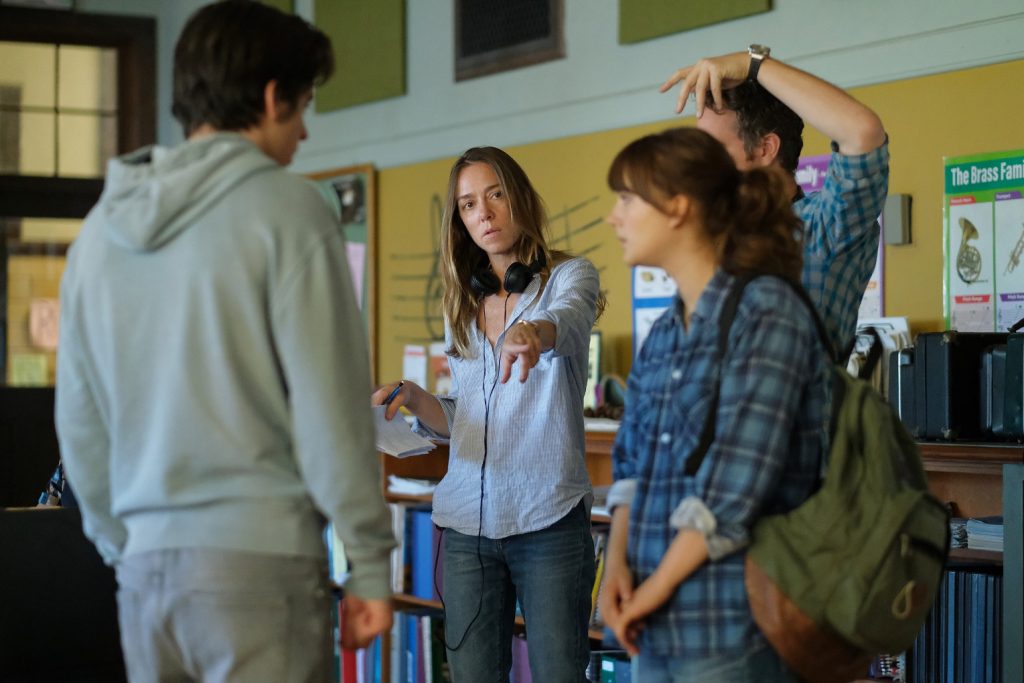
Q: What was it like working with Siân?
Emilia Jones: Oh my gosh. How long have you got? I could go on and on and on about how amazing Siân is. She is the most incredible director I’ve ever worked with. I knew from the minute I met her that I wanted to work with her. She had this kind of openness, she wasn’t bound to the script. When we were on set, she was aware that we all knew these characters inside out and better than anybody else, so it was very much, what do you think you would say here? What do you think you would do? I just loved that we could have this kind of teamwork approach.
I also loved that we all lived as these characters. She wanted everything to be authentic, so we went out on the fishing boat at 4am. We went rock jumping on the weekend, Siân and I, and Paula, our D of P, and Ferdia, and it was a bonding experience. I just loved how perceptive she is, how direct she is. I love that she knows what she wants. She taught me so much. With her instinctive tweaks, she can absolutely transform a scene. I admire her so, so much, and I’m so grateful that I was able to work with her. I love her as a person and as a director.
Troy Kotsur: I’ve worked with many different directors. I didn’t expect it, but she did her homework before I even met her. She knew about Deaf culture and signing. She had been to Deaf West performances on stage, and she got together with sign language consultants and did her due diligence. That gave her more cultural sensitivity. It was awesome working with her. She always was trying to learn more signs and then when we were off-camera, we had conversations while the interpreters took their breaks. They had to go get a drink of water, go to the bathroom, and we would just confer, and it was so nice to see her give that effort every time, every situation.
For example, in the Rossi family house, the hearing crew had already laid out all the furniture, and Marlee took a look and said, this isn’t Deaf-friendly. A Deaf family, we’d be sitting opposite one another to give eye contact, that’s how we communicate. Hearing people can sit side-by-side, they’re depending on the sound. They don’t care where the furniture is. But for the Deaf, logistics are important, and so they made those necessary changes to fit that cultural need. It just showed that she had such an open mind, and that’s what’s so great about working with her. I was very fortunate to be working with her.
Q: The mother-daughter relationship between Jackie and Ruby is very interesting. How did you build that?
Marlee Matlin: As a mother of four, it helped that I had that maternal instinct within me. I made sure that Emilia got plenty of sleep, that she was well-fed, that she was well taken care of, but then I realized that Emilia was a pro. At seventeen, she was a pro. She took care of herself. I was extremely impressed with her professionalism, and she’s probably one of the most darling people I’ve ever met. She’s so loving and so giving and one of the hardest-working actors I’ve ever met too.
She had to wear a lot of hats in this film. And we connected, just like that. When we first met, we all had dinner together and it was as the Rossi family, but we were outside of the film set, and she blended in with us. It fit her like a glove, the role. My son and Emilia became very good friends at the same time. He’s one year older than Emilia, but they became very good friends and are still friends to this day. She’s just so very approachable, and I hope that I get a chance to work with her again.
Emilia Jones: I was extremely lucky, because all of our interpreters on set were CODAs. So it meant that, not only was I surrounded by Marlee, Troy, and Daniel, deaf consultants, I also had five or six CODAs there with me all the time, so I was constantly asking questions. It was nice because although all their experiences were very similar, they’re also very different. One of our interpreters, actually, we say she’s real life Ruby, her name is Heather Rossi, and her family has a fishing boat, she used to go out on the water, and her parents are deaf, and so I would always talk to her about how she felt in certain moments. The scene where Ruby goes swimming with Miles, and decides to rebel, when she’s kind of at breaking point, I talked to Heather. And Heather said, yeah, there are times, like at the Christmas dinner table, where I’m signing for everybody, and I just want to take a break and eat my meal, but then my dad’s like, that’s rude, we’re left out now. Both sides are correct. It’s hard, because Ruby is only seventeen, as well.
She’s resenting that she can’t be a kid, but also, she wouldn’t have it any other way. The minute she finds this love for singing, she feels like she can’t go. It’s not her parents that are holding her back, it’s her. There are a lot of moments in the film where I talked to the CODAs and I asked how they felt. Some of the scenes, like the scene where Ruby’s asking, why are you putting this on me? Are you blaming me? And when she’s saying she wants to go to Berkeley, and at the back of the pickup truck with Troy. They would call cut and the CODAs would be crying. Siân and I looked at each other and we were like, okay, so we’re telling something that’s truthful and accurate.
Marlee Matlin: The one thing that I think I found the most difficult was the scene in which Ruby says to Jackie, I want to sing, and Jackie says, what? You want to sing? If we were blind, would you want to be a painter? She made it about herself. She didn’t have anything to do with her daughter’s dreams or her desires or her talent. She made it all about herself. But I think that was just Jackie expressing her fear that she would lose her daughter, that she didn’t have an understanding of the world that she was interested in. And that’s probably why she said that. So you’re a singer and we’re Deaf, it doesn’t make sense.
That was probably one of the most selfish thing Jackie could have said and it’s something that Marlee, myself, had a hard time filming, but then Siân said, use this frustration with Jackie. And I have to say that, I didn’t like Jackie in this scene very much because as a mother, I couldn’t believe the comment that she would have made to Ruby when Ruby wanted to express herself. She was robbing her daughter of her dream! Why would she want to say no to her? But, hey, at the same time, it happens. It does happen, one way or another. And sometimes it happens between daughter and parent the other way around, where the family wants to do something and the daughter does not. For me, it was not about being Deaf. It’s about how you as a parent have approached life and how you deal with your children. And that’s where I struggled with Jackie, I really did.
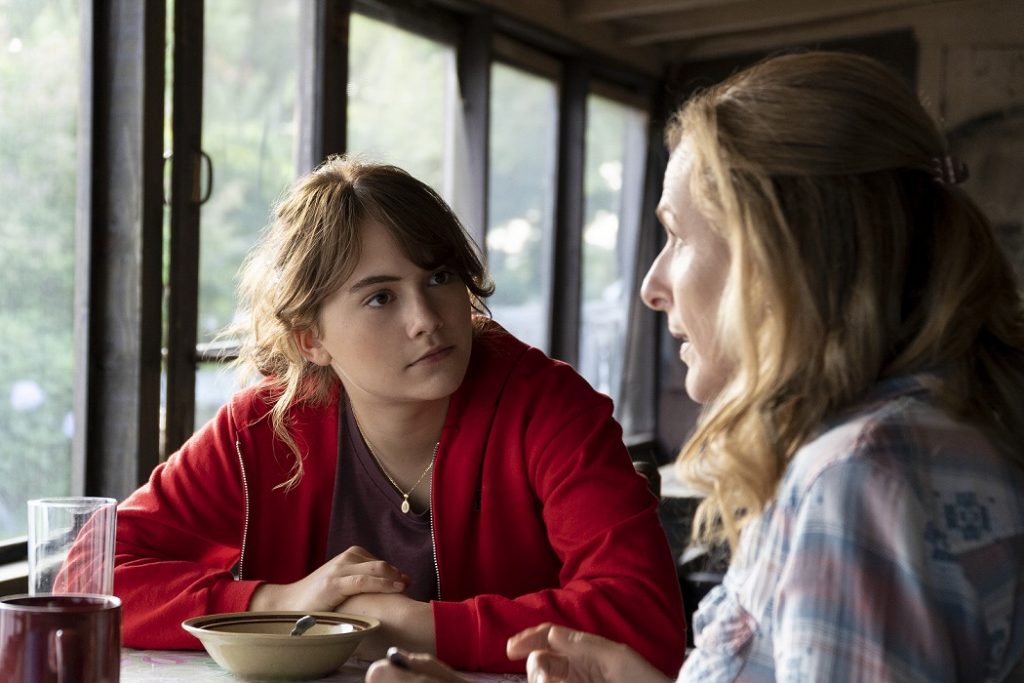
Q: Emilia, what was most challenging and rewarding for you in the process of playing this part?
Emilia Jones: Sign language was definitely the most rewarding. I have learned a skill for life now, and I’m continually learning. I fell in love with the language. Everything was daunting in its own way. I had never had a singing lesson before, or done anything at the skill required for CODA. But I was in the choir at school and I’m always humming around the house, and I did a musical in the West End when I was about eight, so I had sung before. But that a bit daunting to me, because I had auditioned with Landslide by Fleetwood Mac, and I did this quiet cover on my guitar, and then suddenly when I turned up for my first singing lesson, they were throwing Etta James songs and Aretha Franklin songs, and those are adult women with adult voices, and I was seventeen when I shot this movie. So that was a bit daunting. Obviously, the sign language, I knew that Ruby is a CODA, so ASL is her first language. So I knew that I had to be as driven as fluent as possible.
Troy Kotsur: It was an amazing thing to observe the way that she just absorbed the language. Not just learning that, learning how to fish, learning how to sing on that level, and also picking up an American accent for the character. I didn’t realize that she had to acquire all that, and I remember the first day meeting Emilia, we’re out on the boat, and the fishermen were showing us how to fillet the fish and get rid of the things that we didn’t need, the entrails. And I thought she was going to be squeamish. Honestly, she was like a grizzled veteran, and I thought she had experience fishing growing up, and I asked her that, and she said, no, this is actually my first time. I thought, wow, impressive. Yeah, me too. It was awesome. She worked so hard. She was very committed, responsible. She gave it her all, as much as she could to the role. And I’m very proud to have her as part of the cast.
Q: What has the experience for Deaf actors been like in Hollywood, and are there other projects like this?
Marlee Matlin: Looking at my career and having the opportunity over the years to see appearances of, whether we’re talking about character arcs or episodic parts, Deaf actors, or what I’ve done, for example, like on The West Wing or The L Word or Quantico and Picket Fences, what I’ve seen is that we weren’t in any of the lead roles. I wasn’t in the lead roles, I was more of a guest star. And I think we still haven’t seen Deaf actors who are the core of a television show. And I think that needs to change. Recently, NBC announced that I have a show which I will be carrying. So I hope that this is something that will come to fruition. And this is one example of what we need to see more of. NBC recognized that we need shows like this in which a Deaf character carries the television show. I think a lot of them are background actors or they’re supporting characters, and people feel as if somehow this box has been checked, but there are so many actors out there, including behind the camera, where we’re talking about costume designers and makeup artists and directors and writers, and they need to be used.
Siân Heder: In my research, it was difficult to find films that I felt like had strong Deaf characters that were fully realized, three-dimensional characters, and even when you go back and watch Marlee, who was absolutely brilliant in Children of a Lesser God, there are things about that film that feel dated and now not representative. I think it was challenging to look. There’s a show called This Close that’s on the Sundance Channel now, which has a Deaf creator, Shoshannah Stern, and has a bunch of Deaf characters. So I think there’s more stuff, even in TV, that is representative. But it was important to me to have, when I was writing the script, many Deaf consultants reading the script, working with me on what are the tropes that are out there, what has been this history of harmful representation, and how do we make sure that we’re creating characters that feel fully realized and also aren’t leaning into those things.
I think the key is specificity. I was not trying to represent the Deaf experience. I was representing this one family in Gloucester, Massachusetts, who were fishermen and had regionalisms and were this very specific fishing clan. And each of these family members is totally individual and having their own experience, and I think it’s the specificity that’s very helpful in representation now, where you’re not trying to make blanket characters that speak for an entire community. It was really just about understanding this family, who they were, how they related to each other, and then making sure that I was working with my actors to dig into these characters in as deep a way as we could.
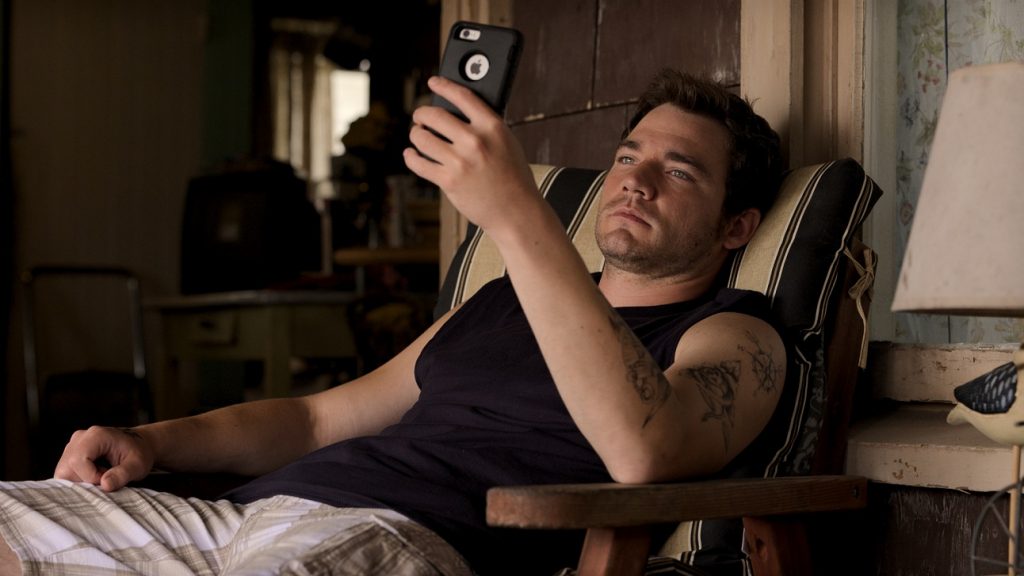
Q: How did your theater experience prepare you for this film, and how are they different?
Daniel Durant: Well, with TV and movies, I feel like they’re pretty similar. But when it comes to the theater on stage, it’s wildly different. It’s so different. When you’re onstage, you have to use so much energy, like your full body, you’re moving around, everything depends on how big is the audience, how big is the house. You have to have giant facial expressions, giant hand maneuvers to get to all the way to the back row. People buying those cheap seats in the back, you want to connect with them as well. You want to throw all of your energy out there. When you’re looking at TV and movies, the camera is so close.
It’s right up in your face. You’re very close, and you have to sign in a smaller space, make sure your hands are not going out of frame, smaller expressions. Kind of more natural a little bit. And also, when you’re onstage in the theater, the story starts and you go all the way to the end right? With TV shows, maybe not, and with film, when you’re filming, you don’t film the scenes in order. I remember the first day we started filming CODA, we started with the last scene first, the last scene of the movie, and I’m like, oh, okay, that’s weird, I’m going to start there, start at the end.
Troy Kotsur: In the past, when I was a younger guy, back in the 1980s, opportunities were very limited. Hearing people were the producers, the directors, and there wasn’t much Deaf representation, and things got lost. And so I went the theater route, which is more accessible. It was more-Deaf friendly, there were more Deaf productions to be a part of, but that’s a live experience. It’s a little bit different. And then on the TV show, Sue Thomas: F.B.Eye, the star happened to be my wife. I was at that set almost every day for a three-year span. And I would visit my wife on the set.
And I always took advantage of the fact that they had the interpreter there for her, and then sometimes I would borrow the interpreter to ask about the director of photography or sound or costumes, fight scenes with stunt actors, and driving scenes, and learned all of those different nuances. And then I would focus on the car chase the next day and see how they did that. I learned all of this information, and I made a short film based on what I learned there. And that enhanced my knowledge, and then when it came time to be in TV and film, I was already familiar. I had that experience there at the set, and also my theatrical experience. It’s nice to be able to wear a couple of different hats and have that background, so that I don’t feel limited. Who’s going to stop me? Nobody’s going to take away my deafness.
Q: How was this on-set experience different in terms of inclusion and opportunities?
Marlee Matlin: I’ve always been on a set as the only deaf actor in the project. I’m there with an interpreter and it gets a bit lonely, but I don’t want anyone to pity me. It just means that everybody’s talking and I feel like I’m missing out on 98% of the conversation. If the interpreter is eating and we’re in a conversation, I have to look down because obviously I need to let my interpreter have their own time or their own break. So I will just go to my trailer or I’ll talk one-on-one with an actor, but communication is little bit difficult. On this set, it was completely different. I felt as if the hearing people were the minority, and by that I mean, hands were flying everywhere. To my left and to my right. My actors, who are all Deaf, we were just conversing freely, and the hearing people were looking at us as the minority. We had an ASL master who could sign, we had a director who could sign. We were totally in our element here.
Siân Heder: As an outsider coming in to represent an experience or a community that is not your own, you feel an enormous amount of responsibility to do your research, bring on a team that’s going to support that. Make sure you’re constantly putting yourself in check. Looking at today in terms of authenticity or diversity or casting, beyond doing the right thing, it’s an incredible creative opportunity that people are missing, because my experience working on the film, learning to sign, signing with my actors, bringing that culture onto the set where the set was taking on that ASL culture, was life-changing and grew me as a human and an artist. And so, in a way, putting on the costume of an identity when it is a cultural identity of a marginalized community, it’s harmful because you’re robbing yourself of that experience, and it was a very powerful experience to work in this way. And the creative opportunities of capturing these moments on set where Marlee and Troy are improvising during the concert scene, and she’s asking him what he wants for dinner, and he’s saying spaghetti.
Those were completely improvised moments and actually, I was in the edit, and we didn’t have an interpreter that day on set, so I thought he was actually staying vibrations when he did this, and then I finally sent it to Anne, and she said, no, he’s saying spaghetti, not vibrations. There were these brilliant comedic moments, that came, there were brilliant emotional moments that came, and I never would have had that with hearing actors. Not to mention, there’s just so much talent within the Deaf community. Troy has been a member of Deaf West for thirty years. The guy is absolutely brilliant and he should be in movies all the time. So, I feel lucky to have been able to work with these actors and I think they should be working all the time.
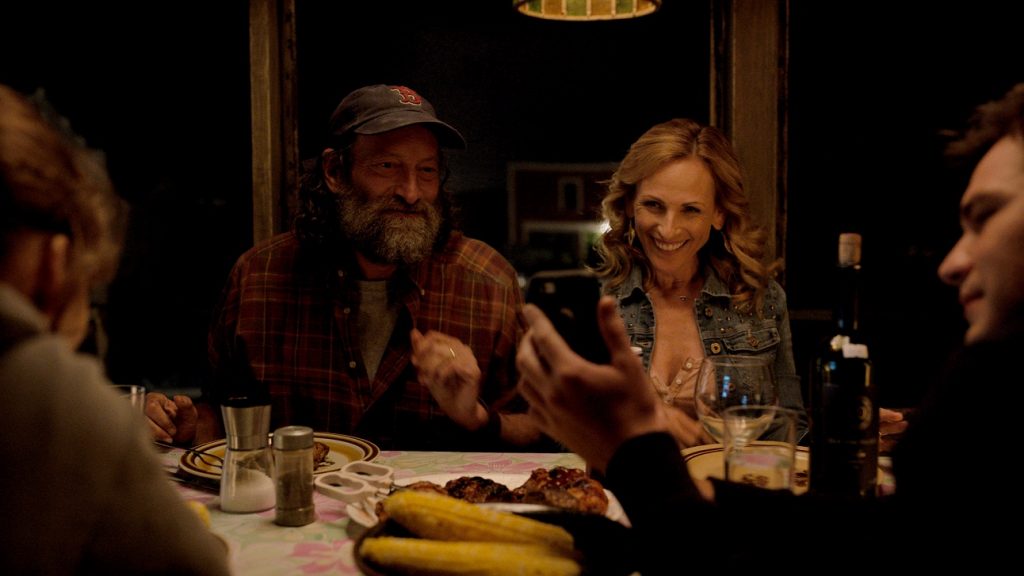
Q: What was it like to be married to Marlee onscreen?
Troy Kotsur: Wow, it was a blessing and an honor to be able to work with Marlee. I can remember as a young guy, I was seventeen when I saw Children of a Lesser God, and I saw signing on the silver screen and the star was Marlee, and that inspired me, and I said to my friends, one day, I’m going to get to work with her. And look, thirty years later, here I am. We’re working together on this movie, and we just have a fun, easy relationship. We joke around. We laugh, and the advantage is that we had already known each other for years prior. We would meet from time to time. She came to see some of my theatrical performances. I’ve watched her TV show. The Deaf community is tight-knit, and we got very comfortable working together in several productions. And now with CODA, it was just a wonderful benefit that we had the relationship forged already, and we brought that to the movie. We both use sign language and we had direct communication with each other, and it was so much fun the whole time.
Q: Will this film’s success at Sundance and now coming to a wide audience on Apple TV+ help create more opportunities for Deaf actors?
Daniel Durant: I hope so. I really, really do. I would love to see more Deaf actors. I mean, there have been more Deaf actors in general, more Deaf roles. For example, when we’re talking about the lead roles or enduring characters on series, it just has not happened. They come up for a couple episodes and then they’re gone. Nobody really carries the movie. So I hope that CODA definitely opens a door to have more lead roles and significant roles for Deaf actors. I hope so. And also, Deaf actors are out here! We want work, and we hope you want to work with us too.
CODA opens in theaters and on Apple TV+ this Friday, August 13th.

